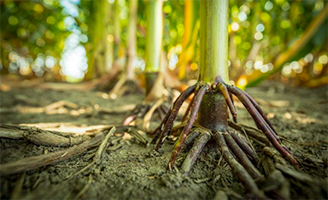 It’s no secret nitrogen is one of the most important nutrients for a corn crop. Once nitrogen is lost, corn plants themselves may not be far behind. What seems to be a bit more secretive, or at least mysterious, is how nitrogen stabilizers work to keep as much of the nutrient as possible available for those plants.
It’s no secret nitrogen is one of the most important nutrients for a corn crop. Once nitrogen is lost, corn plants themselves may not be far behind. What seems to be a bit more secretive, or at least mysterious, is how nitrogen stabilizers work to keep as much of the nutrient as possible available for those plants.
It all comes down to simple science (well, simple for the scientists anyway; it takes just a little more explaining for the rest of us).
Corn uses nitrogen in two forms: ammonium and nitrate. Ammonium is preferable to corn, because it’s easier for plants to absorb and it’s less susceptible to loss. Nitrate is more easily susceptible to loss via leaching and denitrification. Unfortunately, there are strains of bacteria that convert ammonium into nitrate to use for their own nutrients.
Corteva Agriscience’s line of nitrogen stabilizers, called nitrogen maximizers, includes N-Serve® and Instinct®. Both products work below the soil to slow down those bacteria, ensuring the nitrogen can stay in ammonium form longer. The maximizers extend the ammonium’s useful life for up to eight additional weeks, keeping nitrogen near the corn’s roots for when the plant is ready to absorb it.
The result is that the corn crop can get the maximum out of the farmer’s nitrogen application and the farmer, in turn, can get the maximum out of his or her investment, leading to a profitable yield.
With an extremely rainy spring across much of the Corn Belt and with planting being significantly delayed, nitrogen is especially vulnerable to loss this season. So, it’s especially important to ensure your customers’ investments are as safe as possible. Nitrogen maximizers can help.
Instinct is not registered for sale or use in all states. Contact your state pesticide regulatory agency to determine if a product is registered for sale or use in your state. Federal law does not require any person who applies or supervises the use of Instinct to be certified in accordance with EPA regulations and state, territorial and tribal laws. Some states may have additional requirements related to liquid manure and nitrogen stabilizers. Be sure to consult your state or local Extension service to understand your requirements. When applying Instinct to deep pits, appropriate manure agitation safety steps should be followed. Instinct should be applied directly to the deep pit prior to pumping the pit; a thorough agitation system must be operating in order to evenly distribute Instinct within the deep pit; applicators and handlers of Instinct and manure treated with Instinct are required to use proper protective equipment as stated on the product label; air ventilation systems must be operational inside barns. Do not fall-apply anhydrous ammonia south of Highway 16 in the state of Illinois. Always read and follow label directions.
The More You Grow
Find expert insights on agronomics, crop protection, farm operations and more.